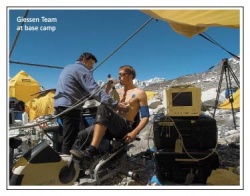Todays treatments
and training tomorrow's specialists
Dr Christiane Eickelberg, of the University of Giessen Lung Centre (UGLC), outlines the centre's research projects, aims and academic offerings

Science can be breathtaking at UGLC: The ‘Giessen Everest Experiment’, a challenging high altitude study organised by a team of physicians (pictured above), is an extreme example of clinical research; it is also a milestone in the recent approval of Revatio, better known as Viagra, by the US Food and Drug Administration (FDA) as a treatment for pulmonary arterial hypertension (PAH).
At sea level, in the heart of Germany, interested members of the public and patients can more easily benefit from and share in UGLC’s collective research spirit, for the centre constitutes a busy scientific network that incorporates 20 research groups with over 120 basic scientists and clinicians.
Close interaction on the Giessen University Hospital campus ensures that UGLC members can work effectively to meet patient’s needs and match capabilities. ‘We believe in translational science,’ says Professor Werner Seeger, chairman of the renowned centre, ‘and we aim to deliver our research directly from bench to bedside.’ With the orchestrated pursuit of clinical, research and training activities in pulmonary medicine, UGLC members seek a new approach to understand, treat, and ultimately prevent lung diseases. The clinical departments of medicine, surgery and paediatrics offer modern patient care and services to juvenile and adult patients suffering various lung diseases. The UGLC also has emergency and intensive care units with adjoining wards, including facilities designed especially for treatment of rare and specific lung diseases. Additionally, the centre hosts highly specialised ambulatory care facilities for all general lung diseases, as well as specific pulmonary infections (i.e. HIV/AIDS, avian influenza), juvenile and adult mucoviscidosis, lung cancer, fibrotic or chronic obstructive lung diseases including asthma, pulmonary hypertension, and sleep related disorders. Some of these facilities, namely those focusing on pulmonary hypertension and lung fibrosis, care for the largest patient groups in Europe.
Daily, UGLC clinicians are supported by the skilled diagnostic experts in the Institutes of Microbiology, Virology, Pathology and Pharmacology.
With a continuous emphasis on research and innovation, the centre looks back on long traditions of inventive treatment strategies, vaccines, diagnostic tests, and other technologies that have improved health. The exchange of complementary scientific knowledge, skills and experience of the cardiopulmonary system is fertilised by a joint dedication to education. UGLC faculty members actively engage in a conjunctive concept to integrate young scientists and clinicians from all over the world in clinical fellowships and a PhD training programme specialised in pulmonary medicine and molecular biology.
Details: www.uglc.de
03.08.2006





